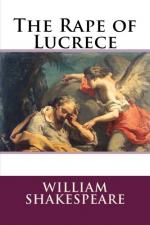|
This section contains 4,165 words (approx. 14 pages at 300 words per page) |

|
SOURCE: “Woman, Language, and History in The Rape of Lucrece,” in Shakespeare Survey, Vol. 44, 1992, pp. 33-39.
In the following essay, Berry asserts that Lucrece is not simply a victim of patriarchal power, but that she more importantly functions as a strong voice for action and political change.
Recent feminist criticism of Shakespeare's The Rape of Lucrece (or Lucrece, as it was titled in its first five quartos) has stressed the extent to which the idea of woman which it represents is one overdetermined by patriarchal ideology, and has typically interpreted Lucrece herself as a sign used to mediate and define men's relationships to men.1 While I am partially in agreement with such interpretations of the poem, I want here to question the view that at no point in the poem is Lucrece represented as posing any contradiction, any aporia, within patriarchal discourse. Nancy Vickers, in her celebrated essay...
|
This section contains 4,165 words (approx. 14 pages at 300 words per page) |

|


